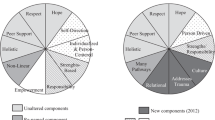Abstract
This experiment compared the effectiveness of an unlocked, mental health consumer-managed, crisis residential program (CRP) to a locked, inpatient psychiatric facility (LIPF) for adults civilly committed for severe psychiatric problems. Following screening and informed consent, participants (n = 393) were randomized to the CRP or the LIPF and interviewed at baseline and at 30-day, 6-month, and 1-year post admission. Outcomes were costs, level of functioning, psychiatric symptoms, self-esteem, enrichment, and service satisfaction. Treatment outcomes were compared using hierarchical linear models. Participants in the CRP experienced significantly greater improvement on interviewer-rated and self-reported psychopathology than did participants in the LIPF condition; service satisfaction was dramatically higher in the CRP condition. CRP-style facilities are a viable alternative to psychiatric hospitalization for many individuals facing civil commitment.


Similar content being viewed by others
References
American Psychiatric Association. (1994). DSM-IV: Diagnostic & statistical manual of mental disorders (4th ed.). Washington, DC: American Psychiatric Association.
Andrews, F. M., & Withey, S. B. (1976). Social indicators of wellbeing: American perceptions of life quality. New York, NY: Plenum.
Arntzen, B., Greenfield, T. K., Harris, A. M., & Sundby, E. (1995). CRF: Early experiences at Sacramento’s consumer run crisis residential program. Journal of the California Alliance for the Mentally Ill, 6(3), 35–36.
Beard, J. H., Propst, R. N., & Malamud, T. J. (1982). The Fountain House model of psychiatric rehabilitation. Psychosocial Rehabilitation Journal, 5, 47–55.
Borkman, T. (1990). Experiential, professional, and lay frames of reference. In T. J. Powell (Ed.), Working with Self-help (pp. 3–30). Silver Spring, MD: National Association of Social Workers, Inc.
Borkman, T. (1999). Understanding Self-help/Mutual Aid: Experiential learning in the commons. New Brunswick, NJ: Rutgers University Press.
Boruch, R. F., & Wothke, W. (1985). Seven kinds of randomization plans for designing field experiments. In R. F. Boruch & W. Wothke (Eds.), Randomization and Field Experimentation (Vol. 28, pp. 95–114). San Francisco: Jossey-Bass Inc. Publishers.
Bryk, A. S., & Raudenbush, S. W. (1992). Hierarchical Linear Models: Applications and data analysis methods. Newbury Park, CA: SAGE Publications.
Chamberlin, J. (1978). On our own: Patient controlled alternatives to the mental health system. New York: McGraw-Hill.
Davidson, L., Chinman, M., Kloos, B., Weingarten, R., Stayner, D., & Tebes, J. K. (1999). Peer support among individuals with severe mental illness. Clinical Psychology: Science and Practice, 6, 165–187.
Deegan, P. E. (1992). The Independent Living Movement and people with psychiatric disabilities: taking back control over our own lives. Psychosocial Rehabilitation Journal, 15(3), 3–19.
Dolnak, D., Rapaport, M. H., & Hawthorne, W. (1998). Letter: Residential treatment for patients in crisis. Psychiatric Services, 49, 246.
Felton, B. J. (2005). Defining location in the mental health system: a case study of a consumer-run agency. American Journal of Community Psychology, 36, 373–386.
Greenfield, T. K. (1998). Crisis Residential Facility, Sacramento, California. Research project findings: final report to the Center for Mental Health Services (Grant no. HD55M51339). Sacramento, CA: State of California, Department for Public Health, Sacramento County Department of Mental Health.
Greenfield, T. K. & Attkisson, C. C. (1989a). Family satisfaction with services (Report to Northwest Residential Services, Inc.). San Francisco, CA: Department of Psychiatry, University of California, San Francisco.
Greenfield, T. K., & Attkisson, C. C. (1989b). Steps toward a multifactorial satisfaction scale for primary care and mental health services. Evaluation and Program Planning, 12, 271–278.
Greenfield, T. K., & Attkisson, C. C. (2004). The UCSF Client Satisfaction Scales: II. The Service Satisfaction Scale-30. In M. Maruish (Ed.), Psychological Testing: Treatment planning and outcome assessment (3rd ed., Vol. 3. Instruments for Adults (pp. 813–837). Mahwah, NJ: Lawrence Erlbaum Associates.
Greenfield, T. K. & Stoneking, B. C. (1993). Satisfaction with case management: an experimental test of augmenting staff teams with mental health consumers. 4th Annual National Conference of State Mental Health Agency Services Research and Program Evaluation, National Association for State Mental Health Program Directors Research Institute, Annapolis, MD, October 2–5.
Greenfield, T. K., Stoneking, B. C., & Sundby, E. (1996). Two community support program research demonstrations in Sacramento: experiences of consumer staff as service providers. The Community Psychologist, 29(3), 17–21.
Herman, S. E., Onaga, E., Pernice-Duca, F., Oh, S., & Ferguson, C. (2005). Sense of community in the clubhouse programs: member and staff concepts. American Journal of Community Psychology, 36, 343–356.
Humphreys, K. (Ed.). (1996). Special section on self-help/mutual aid initiatives by people with psychiatric disabilities. Community Psychologist, 29, 9–25.
Kyrouz, E. M., & Humphreys, K. (1996). Do psychiatrically disabled people benefit from participation in self-help/mutual aid organizations? A research review. Community Psychologist, 29, 21–25.
Lee, D. T. (1995). Professional underutilization of Recovery, Inc. Psychiatric Rehabiliation Journal, 19, 63–70.
Lehman, A. F. (1988). A quality of life interview for the chronically mentally ill. Evaluation and Program Planning, 11, 1–12.
Lehman, A. F. (1995). Quality of Life Interview (QOLI). In L. I. Sederer & B. Dickey (Eds.), Outcomes Assessment in Clinical Practice (pp. 117–119). Baltimore, MD: Williams & Wilkins.
McNiel, D. E., Greenfield, T. K., Attkisson, C. C., & Binder, R. L. (1989). Factor structure of a brief symptom checklist for acute psychiatric inpatients. Journal of Clinical Psychology, 45(1), 66–72.
Mowbray, C. T., Chamberlain, P., Jennings, M., & Reed, C. (1988). Consumer-run mental health services: results from five demonstration projects. Community Mental Health Journal, 24(2), 151–156.
Nikkel, R. E., Smith, G. D., & Edwards, D. (1992). A consumer-operated case management project. Hospital & Community Psychiatry, 43, 577–579.
Overall, J. E., & Gorham, D. R. (1962). The Brief Psychiatric Rating Scale. Psychological Reports, 19, 799–812.
Persons, J. B., & Silberschatz, G. (1998). Are randomized controlled trials useful to psychotherapists? Journal of Consulting and Clinical Psychology, 66, 126–135.
Raudenbush, S. W., Bryk, A. S., Cheong, Y. F., & Congdon, R. T., Jr. (2000). HLM 5. Hierarchical Linear and Nonlinear Modeling. Lincolnwood, IL: Scientific Software International.
Rosenberg, M., Schooler, C., & Schoenbach, C. (1989). Self-esteem and adolescent problems: modeling reciprocal effects. American Sociological Review, 54(1), 1004–1018.
Inc, S. P. S. S. (1999). SPSS for Windows, Release 10.0.5 (27 Nov 1999), Standard Version. Chicago, IL: SPSS Inc.
Stoneking, B. C., & Greenfield, T. K. (1994). Sacramento county’s consumer case manager project. Final Report to the Center for Mental Health Services, Grant No. R18 MH46146. Sacramento, CA: Sacramento County Department of Health and Human Services and California State Department of Mental Health.
Stroul, B. A. (1987). Crisis residential services in a community support system. Rockville, MD: National Institute of Mental Health, Community Support Program.
Stroul, B. A. (1993). Psychiatric crisis response systems: a descriptive study (Vol. 39). Rockville, MD: Center for Mental Health Services, Community Support Program.
Tessler, R. C., & Goldman, H. H. (1992). The Chronically Mentally Ill: Assessing community support programs. Cambridge, MA: Ballinger.
Trainor, J., Shepher, M., Boydell, K. M., Leff, A., & Crawford, E. (1997). Beyond the service paradigm: the impact and implication of consumer/survivor initiatives. Psychiatric Rehabiliation Journal, 21, 132–140.
Woerner, M. G., Nammuzza, S., & Kane, J. M. (1988). Anchoring the BPRS: an aid to improved reliability. Psychopharmacology Bulletin, 24, 112–114.
Wylie, R. C. (1974). The self-concept: A review of methodological considerations and measuring instruments (rev. ed.). Lincoln, NB: University of Nebraska.
Zinman, S., Harp, H. T., & Budd, S. (Eds.). (1987). Reaching across: mental health clients helping each other. Riverside, CA: Self-Help Committee of the California Network of Mental Health Clients.
Acknowledgments
Support in preparation of this article is gratefully acknowledged from the Center for Mental Health Services, SAMHSA (grant number R18 MH51339), the State of California and the County of Sacramento. Opinions are those of the authors and may not necessarily reflect those of the involved or sponsoring agencies.
Author information
Authors and Affiliations
Corresponding author
Rights and permissions
About this article
Cite this article
Greenfield, T.K., Stoneking, B.C., Humphreys, K. et al. A Randomized Trial of a Mental Health Consumer-Managed Alternative to Civil Commitment for Acute Psychiatric Crisis. Am J Community Psychol 42, 135–144 (2008). https://doi.org/10.1007/s10464-008-9180-1
Published:
Issue Date:
DOI: https://doi.org/10.1007/s10464-008-9180-1




